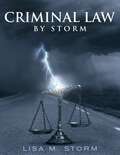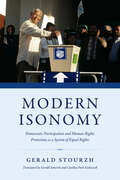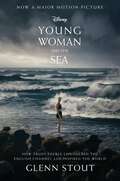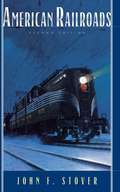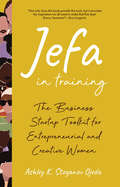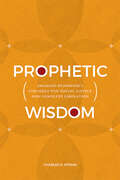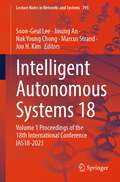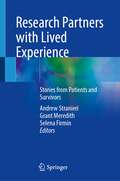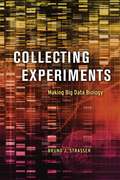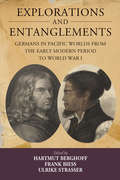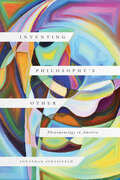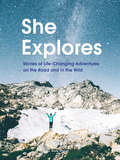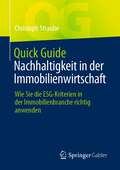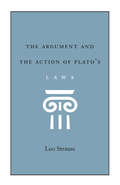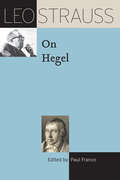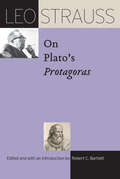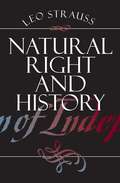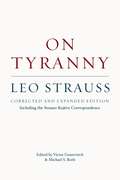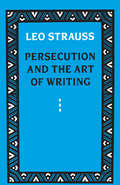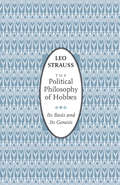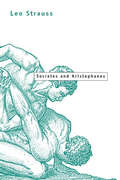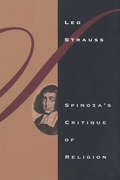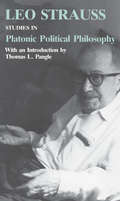- Table View
- List View
Criminal Law By Storm
by Lisa M. StormCriminal Law By Storm begins with the foundations of law and the legal system, then extensively explores criminal laws and defenses using general state and federal principles, the Constitution, and the Model Penal Code as guidelines. This engaging and interactive textbook will enhance your ability to be successful in academics or a career in law, criminal justice, or paralegal. Lisa M. Storm, Esq. has taught at the community college, four-year, and graduate levels since 1992. Currently, she is a tenured faculty member in Administration of Justice at Hartnell College, a California Community College. She is also an attorney and licensed member of the California State Bar.
Modern Isonomy: Democratic Participation and Human Rights Protection as a System of Equal Rights
by Gerald StourzhUntil the eighteenth century, Western societies were hierarchical ones. Since then, they have transformed themselves into societies dominated by two features: participatory democracy and the protection of human rights. In Modern Isonomy, distinguished political theorist Gerald Stourzh unites these ideas as “isonomy.” The ideal, Stourzh argues, is a state, and indeed a world, in which individual rights, including the right to participate in politics equally, are clearly defined and possessed by all. Stourzh begins with ancient Greek thought contrasting isonomy—which is associated with the rule of the many—with “gradated societies,” oligarchies, and monarchies. He then discusses the American experiment with the development of representative democracy as well as the French Revolution, which proclaimed that all people are born and remain free and with equal rights. But progress on the creation and protection of rights for all has been uneven. Stourzh discusses specifically the equalization of slaves, peasants, women, Jews, and indigenous people. He demonstrates how deeply intertwined the protection of equal rights is with the development of democracy and gives particular attention to the development of constitutional adjudication, notably the constitutional complaint of individuals. He also discusses the international protection human rights. Timely and thought-provoking, Modern Isonomy is an erudite exploration of political and human rights.
Young Woman And The Sea: How Trudy Ederle Conquered the English Channel and Inspired the World
by Glenn StoutSOON TO BE A MAJOR MOTION PICTURE FROM DISNEY STARRING DAISY RIDLEY.The exhilarating true story of Trudy Ederle, the first woman to swim the English Channel, and inspire a “wave of confidence and emancipation” for women in sports (Parade).By age twenty, at the height of the Jazz Age, Trudy Ederle was the most accomplished swimmer in the world. She’d won Olympic gold and set a host of world records. But the greatest challenge remained: the English Channel. Only a few swimmers, none of them women, had ever made the treacherous twenty-one mile crossing. Trudy’s failed first attempt seemed to confirm what many naysayers believed: No woman could possibly accomplish such a thing.In 1926, Ederle proved them wrong. As her German immigrant parents cheered her, and her sister and fellow swimmer Meg helped fashion both her scandalous two-piece swimsuit and leak-proof goggles, Trudy was determined to succeed. “England or drown is my motto,” she said, plunging into the frigid Channel for her second attempt at the crossing. Fourteen hours later, two hours faster than any man, and after weathering a gale and waves that approached six-feet, she stepped onto Kingsdowne Beach as the most famous woman in the world.Based on years of archival research that unearthed Ederle’s memory from obscurity, Young Woman and the Sea brings to life the real Trudy Ederle, the challenges that came with her fame, and the historic mark her achievement made for all women athletes who followed.
American Railroads (Chicago History Of American Civilization Ser.)
by John F. StoverFew scenes capture the American experience so eloquently as that of a lonely train chugging across the vastness of the Great Plains, or snaking through tortuous high mountain passes. Although this vision was eclipsed for a time by the rise of air travel and trucking, railroads have enjoyed a rebirth in recent years as profitable freight carriers. A fascinating account of the rise, decline, and rebirth of railroads in the United States, John F. Stover's American Railroads traces their history from the first lines that helped eastern seaports capture western markets to today's newly revitalized industry. Stover describes the growth of the railroads' monopoly, with the consequent need for state and federal regulations; relates the vital part played by the railroads during the Civil War and the two World Wars; and charts the railroads' decline due to the advent of air travel and trucking during the 1950s. In two new chapters, Stover recounts the remarkable recovery of the railroads, along with other pivotal events of the industry's recent history. During the 1960s declining passenger traffic and excessive federal regulation led to the federally-financed creation of Amtrak to revive passenger service and Conrail to provide freight service on bankrupt northeastern railroads. The real savior for the railroads, though, proved to be the Staggers Rail Act of 1980, which brought prosperity to rail freight carriers by substantially deregulating the industry. By 1995, renewed railroad freight traffic had reached nearly twice its former peak in 1944. Bringing both a seasoned eye and new insights to bear on one of the most American of industries, Stover has produced the definitive history of railroads in the United States.
Jefa in Training: The Business Startup Toolkit for Entrepreneurial and Creative Women
by Ashley K. Stoyanov OjedaStep-by-Step Toolkit to Turn Your Passion Project into a Successful Business“...a much-needed guide for all of us who need a blueprint to becoming a successful entrepreneur.” —Eva Longoria, award-winning actress, producer, director, activist, philanthropist and CEO of UnbeliEVAble Entertainment#1 New Release in Hispanic American Demographic StudiesWomen, now is the time to build your enterprise. Jefa in Training is the only Spanglish project-launching toolkit and female entrepreneur planner specially made for a new generation of boss women.A solopreneur and small business guide. A business startup planner and toolkit for women in leadership, business, and beyond, Jefa in Training offers women entrepreneurs the female empowerment needed to take a side hustle to the next level. Whether it’s learning to define your brand, set up a beta test group, or draft an LLC operating agreement, this compendium of lessons, anecdotes, worksheets, templates, and quotes teaches the next generation of women in business how to work for yourself and turn your ideas into something much bigger.A Latina book by Latinas, for Latinas. Solopreneurs and creatives, you are invited to let go of your fears and finally launch your blog, project, or platform. Jefa in Training isn’t your typical small business book. Part Latinx book, it is a conversation with a special tribe of Latina immigrants, Hispanic American generations, and women of color in financial, media, entrepreneurial, and creative spaces. Explore a more complex view of Latinidad, covering everything from imposter syndrome to micro-aggressions and bilingualism.Inside find: Author's first-hand experiences Guest stories from successful business-women in Latinx companiesWorksheets and more!If you’re looking for Hispanic books, women entrepreneur books, women leadership books, or women of color gifts―like Mind Your Business, The Memo, In the Company of Women, or De Colores Means All of Us―then you’ll love Jefa in Training.
Prophetic Wisdom: Engaged Buddhism's Struggle for Social Justice and Complete Liberation (SUNY series in Religious Studies)
by Charles R. StrainClassical Buddhism lacked an understanding of systemic injustice and its contribution to collective suffering. Despite the teaching of impermanence, classical Buddhist schools viewed social institutions as given and offered no path to social transformation. Today, Buddhists are shaped by multiple religious and secular traditions, including those stemming from the Hebrew prophets. The prophetic tradition offers a socially and religiously powerful concept—the concept of justice—that reconfigures the Buddhist dharma.In a time of unparalleled peril, Buddhists are challenged as never before to turn wisdom into strategic action to foster systemic social change. Compassion is not enough. Prophetic Wisdom shows how Engaged Buddhists can expand their understanding of the causes of collective suffering and develop nonviolent means for social transformation through a dialectic of love, power, and justice. It concludes by confronting the poison of racism in the American body politic.
Intelligent Autonomous Systems 18: Volume 1 Proceedings of the 18th International Conference IAS18-2023 (Lecture Notes in Networks and Systems #795)
by Marcus Strand Soon-Geul Lee Jinung An Nak Young Chong Joo H. KimIntelligent autonomous systems are increasingly being applied in various fields, ranging from industrial applications to professional services and household domains. These advancements in technology and application domains have brought forth the need for continuous research and development to address new challenges in deploying intelligent autonomous systems in a reliable and user-independent manner. This book is a compilation that aims to serve researchers and practitioners in related fields by providing a timely dissemination of recent progress in the areas of autonomous mobility and robotics. The contents of this book are based on a collection of papers presented at the 18th International Conference on Intelligent Autonomous Systems (IAS18 2023), held at the Suwon Convention Center in Suwon, Korea. The conference took place fully in person from July 4 to 7, 2023, with the theme “Impact and Effect of AI on Intelligent Autonomous Systems.” It encompassed discussions on theories, applications, and creative innovations in intelligent autonomous systems, covering topics such as autonomous vehicles, intelligent agents, smart sensors and actuators, smart haptics, human–machine interaction, digital twin, digital health, and metaverse, VR, AR, or MR. For ease of reading, the 91 papers have been grouped into five chapters: Chapter 1: Intelligent Autonomous Vehicles; Chapter 2: Autonomous Robots; Chapter 3: Intelligent Perception and Sensors; Chapter 4: Data Fusion and Machine Learning for Intelligent Robots; and Chapter 5: Applied Autonomous Systems. The articles included in this book underwent a rigorous peer-review process and were presented at the IAS18-2023 conference. For researchers working in the field of intelligent autonomous systems technology, we believe this book provides valuable insights into recent advances in autonomous technologies and applications, thereby enriching their studies. We extend our heartfelt thanks to all the authors and editors who contributed to this edition.
Ratings als Steuerungsinstrument von Unternehmen für eine nachhaltige Entwicklung
by Christian StrangaliesIn diesem Open-Access-Buch wird mit Hilfe einer systemtheoretischen Perspektive untersucht, wie Nachhaltigkeitsratings zu einer sinnvollen Gesellschaft beitragen. In einer grundlegenden Einführung in die Systemtheorie wird erklärt, wie die Selbsterhaltung von sozialen Systemen durch neuen Sinn ermöglicht wird, der auf weiteren Sinn verweist. Daraufhin wird die Notwendigkeit einer nachhaltigen Entwicklung der Gesellschaft systemtheoretisch dargestellt, indem ein pathologisches Wirtschaftssystem beschrieben wird, das die eigene Umwelt zerstört und dadurch immer weniger sinnvolle Anschlussoperationen findet, die weiteren Sinn ermöglichen. Zudem wird erläutert, wie aus systemtheoretischer Sicht ein nachhaltiges Wirtschaftssystem operiert. Es wird ausgeführt, wie durch eine begrenzte Reflexion neuer Sinn für das Wirtschaftssystem erzeugt wird, der im Einklang steht mit den gesellschaftlichen Entwicklungsmöglichkeiten und somit die wirtschaftliche und gesellschaftliche Selbsterhaltung langfristig sicherstellt. Anhand von Nachhaltigkeitsratings wird dann ein konkretes Beispiel angeführt, wie Entscheidungen mit einer begrenzten Reflexion in Unternehmen zu einer solchen sinnvollen Ökonomie beitragen.
Research Partners with Lived Experience: Stories from Patients and Survivors
by Andrew Stranieri Grant Meredith Selena FirminThis book aims to foster collaborations between patients who have intense lived experience with a medical condition or family violence and researchers investigating them. Inviting patients or survivors into the research team is found to have significant advantages, and chapters review the literature on the benefits they can bring to investigative research teams. The collaboration can take place at multiple stages of research from helping to research design, participating in co-investigators, contributing to the interpretation of results, etc. The conditions addressed in this book include medical conditions from anxiety, postural orthostatic tachycardia syndrome, lupus, asthma, chronic kidney disease, etc. The authors are higher degree students, academics, and active research team members who share their experiences. This is be instrumental in helping patients and survivors decide whether to transition to research. It will also support research team leaders in determining how to benefit from the new perspectives researchers with lived experience bring. The personal narratives provide insight into the challenges and rewards of having lived experience while conducting research. This book is a valuable resource for researchers in clinical fields who have been touched by firsthand exposure to a condition and have been motivated to conduct research in the respective fields. The chapters will enrich understanding for adult patients and survivors and for parents of children suffering intense experiences, who engage with the latest research publications. It will also broaden the understanding of medical, biomedical, and health sciences students interested in reading the narrative accounts of patients and survivors. Readers will gain refreshing perspectives and insights. The book relates to patients managing all kinds of noncommunicable diseases or experiences of violence, and how they can share their valuable experiences into future advancementto research. It is related to SDG 3, good health and well-being.
The Phlebotomy Textbook
by Susan King Strasinger Marjorie Schaub Di LorenzoRely on this comprehensive resource to master the techniques you need to safely obtain quality specimens. You’ll understand all the how's and whys that lead to success in this rapidly changing field. Inside, you’ll find the up-to-date coverage of routine procedures and their complications as well specialized procedures, quality and infection control, state-of-the-art equipment, medical terminology, ethical and legal issues, body systems, and related diagnostic laboratory tests. Videos and animations online help you to excel.
Collecting Experiments: Making Big Data Biology
by Bruno J. StrasserDatabases have revolutionized nearly every aspect of our lives. Information of all sorts is being collected on a massive scale, from Google to Facebook and well beyond. But as the amount of information in databases explodes, we are forced to reassess our ideas about what knowledge is, how it is produced, to whom it belongs, and who can be credited for producing it. Every scientist working today draws on databases to produce scientific knowledge. Databases have become more common than microscopes, voltmeters, and test tubes, and the increasing amount of data has led to major changes in research practices and profound reflections on the proper professional roles of data producers, collectors, curators, and analysts. Collecting Experiments traces the development and use of data collections, especially in the experimental life sciences, from the early twentieth century to the present. It shows that the current revolution is best understood as the coming together of two older ways of knowing—collecting and experimenting, the museum and the laboratory. Ultimately, Bruno J. Strasser argues that by serving as knowledge repositories, as well as indispensable tools for producing new knowledge, these databases function as digital museums for the twenty-first century.
Explorations and Entanglements: Germans in Pacific Worlds from the Early Modern Period to World War I (Studies in German History #22)
by Ulrike Strasser Hartmut Berghoff, Frank BiessTraditionally, Germany has been considered a minor player in Pacific history: its presence there was more limited than that of other European nations, and whereas its European rivals established themselves as imperial forces beginning in the early modern era, Germany did not seriously pursue colonialism until the nineteenth century. Yet thanks to recent advances in the field emphasizing transoceanic networks and cultural encounters, it is now possible to develop a more nuanced understanding of the history of Germans in the Pacific. The studies gathered here offer fascinating research into German missionary, commercial, scientific, and imperial activity against the backdrop of the Pacific’s overlapping cultural circuits and complex oceanic transits.
Inventing Philosophy's Other: Phenomenology in America
by Jonathan StrassfeldThe history of phenomenology, and its absence, in American philosophy. Phenomenology and so-called “continental philosophy” receive scant attention in most American philosophy departments, despite their foundational influence on intellectual movements such as existentialism, post-structuralism, and deconstruction. In Inventing Philosophy’s Other, Jonathan Strassfeld explores this absence, revealing how everyday institutional practices played a determinative role in the development of twentieth-century academic discourse. Conventional wisdom holds that phenomenology’s absence from the philosophical mainstream in the United States reflects its obscurity or even irrelevance to America’s philosophical traditions. Strassfeld refutes this story as he traces phenomenology’s reception in America, delivering the first systematic historical study of the movement in the United States. He examines the lives and works of Marjorie Grene, Alfred Schütz, Hubert Dreyfus, and Iris Marion Young, among others, while also providing a fresh introduction to phenomenological philosophy.
She Explores: Stories of Life-Changing Adventures on the Road and in the Wild
by Gale StraubFor every woman who has ever been called outdoorsy comes a collection of stories that inspires unforgettable adventure.Beautiful, empowering, and exhilarating, She Explores is a spirited celebration of female bravery and courage, and an inspirational companion for any woman who wants to travel the world on her own terms.Combining breathtaking travel photography with compelling personal narratives, She Explores shares the stories of 40 diverse women on unforgettable journeys in nature: women who live out of vans, trucks, and vintage trailers, hiking the wild, cooking meals over campfires, and sleeping under the stars. Women biking through the countryside, embarking on an unknown road trip, or backpacking through the outdoors with their young children in tow.Complementing the narratives are practical tips and advice for women planning their own trips, including:• Preparing for a solo hike • Must-haves for a road-trip kitchen• Planning ahead for unknown territory• Telling your own story A visually stunning and emotionally satisfying collection for any woman craving new landscapes and adventure.
Quick Guide Nachhaltigkeit in der Immobilienwirtschaft: Wie Sie die ESG-Kriterien in der Immobilienbranche richtig anwenden (Quick Guide)
by Christoph StraubeDieses Buch erklärt, was die ESG-Kriterien Umwelt, Soziales und Governance für die Immobilienbranche bedeuten und wie Unternehmen nachhaltiges Wirtschaften in der Praxis umsetzen können. Der Autor erläutert anschaulich die Auswirkungen in verschiedenen Bereichen, etwa in der Projektentwicklung, der Investitionsplanung, bei Maklern oder im Gebäudemanagement. Darüber hinaus wirft er einen fokussierten Blick auf digitale Lösungen bei der Umsetzung von ESG-Anforderungen und erläutert warum das Thema in Zukunft ganz oben auf die Agenda von Immobilienunternehmen rücken muss
The Argument and the Action of Plato's Laws
by Leo StraussThe posthumous publication of The Argument and the Action of Plato's "Laws" was compiled shortly before the death of Leo Strauss in 1973. Strauss offers an insightful and instructive reading through careful probing of Plato's classic text. "Strauss's The Argument and the Action of Plato's 'Laws' reflects his interest in political thought, his dogged method of following the argument of the Laws step by step, and his vigorous defense of this dialogue's integrity in respect to the ideals of the Republic."—Cross Currents "The unique characteristics of this commentary on the Laws reflect the care and precision which were the marks of Professor Strauss's efforts to understand the complex thoughts of other men."—Allan D. Nelson, Canadian Journal of Political Science "Thorough and provocative, an important addition to Plato scholarship."—Library Journal "The major purpose of the commentary is to provide a reading of the dialogue which displays its structural arrangement and the continuity of the argument."—J. W. Dy, Bibliographical Bulletin of Philosophy "The reader of Strauss's book is indeed guided closely through the whole text."— M. J. Silverthorne, The Humanities Association Review Leo Strauss (1899-1973) was the Robert Maynard Hutchins Distinguished Service Professor Emeritus of political science at the University of Chicago.
Leo Strauss on Hegel (The Leo Strauss Transcript Series)
by Leo StraussIn the winter of 1965, Leo Strauss taught a seminar on Hegel at the University of Chicago. While Strauss neither considered himself a Hegelian nor wrote about Hegel at any length, his writings contain intriguing references to the philosopher, particularly in connection with his studies of Hobbes, in his debate in On Tyranny with Alexandre Koje`ve; and in his account of the “three waves” of modern political philosophy. Leo Strauss on Hegel reconstructs Strauss’s seminar on Hegel, supplemented by passages from an earlier version of the seminar from which only fragments of a transcript remain. Strauss focused his seminar on the lectures collected in The Philosophy of History, which he considered more accessible than Hegel’s written works. In his own lectures on Hegel, Strauss continues his project of demonstrating how modern philosophers related to ancient thought and explores the development and weaknesses of modern political theory. Strauss is especially concerned with the relationship in Hegel between empirical history and his philosophy of history, and he argues for the primacy of religion in Hegel’s understanding of history and society. In addition to a relatively complete transcript, Leo Strauss on Hegel also includes annotations, which bring context and clarity to the text.
Leo Strauss on Plato’s Protagoras (The Leo Strauss Transcript Series)
by Leo StraussA transcript of Leo Strauss’s key seminars on Plato’s Protagoras. This book offers a transcript of Strauss’s seminar on Plato’s Protagoras taught at the University of Chicago in the spring quarter of 1965, edited and introduced by renowned scholar Robert C. Bartlett. These lectures have several important features. Unlike his published writings, they are less dense and more conversational. Additionally, while Strauss regarded himself as a Platonist and published some work on Plato, he published little on individual dialogues. In these lectures Strauss treats many of the great Platonic and Straussian themes: the difference between the Socratic political science or art and the Sophistic political science or art of Protagoras; the character and teachability of virtue, its relation to knowledge, and the relations among the virtues, courage, justice, moderation, and wisdom; the good and the pleasant; frankness and concealment; the role of myth; and the relation between freedom of thought and freedom of speech. In these lectures, Strauss examines Protagoras and the sophists, providing a detailed discussion of Protagoras as it relates to Plato’s other dialogues and the work of modern thinkers. This book should be of special interest to students both of Plato and of Strauss.
Natural Right and History: Lectures And Essays By Leo Strauss, 1937-1946 (Walgreen Foundation Lectures)
by Leo StraussIn this classic work, Leo Strauss examines the problem of natural right and argues that there is a firm foundation in reality for the distinction between right and wrong in ethics and politics. On the centenary of Strauss's birth, and the fiftieth anniversary of the Walgreen Lectures which spawned the work, Natural Right and History remains as controversial and essential as ever. "Strauss . . . makes a significant contribution towards an understanding of the intellectual crisis in which we find ourselves . . . [and] brings to his task an admirable scholarship and a brilliant, incisive mind."—John H. Hallowell, American Political Science Review Leo Strauss (1899-1973) was the Robert Maynard Hutchins Distinguished Service Professor Emeritus in Political Science at the University of Chicago.
On Tyranny: Including the Strauss-Kojève Correspondence
by Leo StraussOn Tyranny is Leo Strauss’s classic reading of Xenophon’s dialogue Hiero, or Tyrannicus, in which the tyrant Hiero and the poet Simonides discuss the advantages and disadvantages of exercising tyranny. Included are a translation of the dialogue from its original Greek, a critique of Strauss’s commentary by the French philosopher Alexandre Kojève, and the complete correspondence between the two.This revised and expanded edition introduces important corrections throughout and expands Strauss’s restatement of his position in light of Kojève’s commentary to bring it into conformity with the text as it was originally published in France.
Persecution and the Art of Writing
by Leo StraussThe essays collected in Persecution and the Art of Writing all deal with one problem—the relation between philosophy and politics. Here, Strauss sets forth the thesis that many philosophers, especially political philosophers, have reacted to the threat of persecution by disguising their most controversial and heterodox ideas.
The Political Philosophy of Hobbes: Its Basis and Its Genesis
by Leo StraussIn this classic analysis, Leo Strauss pinpoints what is original and innovative in the political philosophy of Thomas Hobbes. He argues that Hobbes's ideas arose not from tradition or science but from his own deep knowledge and experience of human nature. Tracing the development of Hobbes's moral doctrine from his early writings to his major work The Leviathan, Strauss explains contradictions in the body of Hobbes's work and discovers startling connections between Hobbes and the thought of Plato, Thucydides, Aristotle, Descartes, Spinoza, and Hegel.
Socrates and Aristophanes
by Leo StraussIn one of his last books, Socrates and Aristophanes, Leo Strauss's examines the confrontation between Socrates and Aristophanes in Aristophanes' comedies. Looking at eleven plays, Strauss shows that this confrontation is essentially one between poetry and philosophy, and that poetry emerges as an autonomous wisdom capable of rivaling philosophy. "Strauss gives us an impressive addition to his life's work—the recovery of the Great Tradition in political philosophy. The problem the book proposes centers formally upon Socrates. As is typical of Strauss, he raises profound issues with great courage. . . . [He addresses] a problem that has been inherent in Western life ever since [Socrates'] execution: the tension between reason and religion. . . . Thus, we come to Aristophanes, the great comic poet, and his attack on Socrates in the play The Clouds. . . [Strauss] translates it into the basic problem of the relation between poetry and philosophy, and resolves this by an analysis of the function of comedy in the life of the city." —Stanley Parry, National Review
Spinoza's Critique of Religion
by Leo StraussLeo Strauss articulates the conflict between reason and revelation as he explores Spinoza's scientific, comparative, and textual treatment of the Bible. Strauss compares Spinoza's Theologico-political Treatise and the Epistles, showing their relation to critical controversy on religion from Epicurus and Lucretius through Uriel da Costa and Isaac Peyrere to Thomas Hobbes. Strauss's autobiographical Preface, traces his dilemmas as a young liberal intellectual in Germany during the Weimar Republic, as a scholar in exile, and as a leader of American philosophical thought. "[For] those interested in Strauss the political philosopher, and also those who doubt whether we have achieved the 'final solution' in respect to either the character of political science or the problem of the relation of religion to the state." —Journal of Politics "A substantial contribution to the thinking of all those interested in the ageless problems of faith, revelation, and reason." —Kirkus Reviews Leo Strauss (1899-1973) was the Robert Maynard Hutchins Distinguished Service Professor Emeritus of political science at the University of Chicago. His contributions to political science include The Political Philosophy of Hobbes, The City and the Man, What is Political Philosophy?, and Liberalism Ancient and Modern.
Studies in Platonic Political Philosophy
by Leo StraussOne of the outstanding thinkers of our time offers in this book his final words to posterity. Studies in Platonic Political Philosophy was well underway at the time of Leo Strauss's death in 1973. Having chosen the title for the book, he selected the most important writings of his later years and arranged them to clarify the issues in political philosophy that occupied his attention throughout his life. As his choice of title indicates, the heart of Strauss's work is Platonism—a Platonism that is altogether unorthodox and highly controversial. These essays consider, among others, Heidegger, Husserl, Nietzsche, Marx, Moses Maimonides, Machiavelli, and of course Plato himself to test the Platonic understanding of the conflict between philosophy and political society. Strauss argues that an awesome spritual impoverishment has engulfed modernity because of our dimming awareness of that conflict. Thomas Pangle's Introduction places the work within the context of the entire Straussian corpus and focuses especially on Strauss's late Socratic writings as a key to his mature thought. For those already familiar with Strauss, Pangle's essay will provoke thought and debate; for beginning readers of Strauss, it provides a fine introduction. A complete bibliography of Strauss's writings if included.
